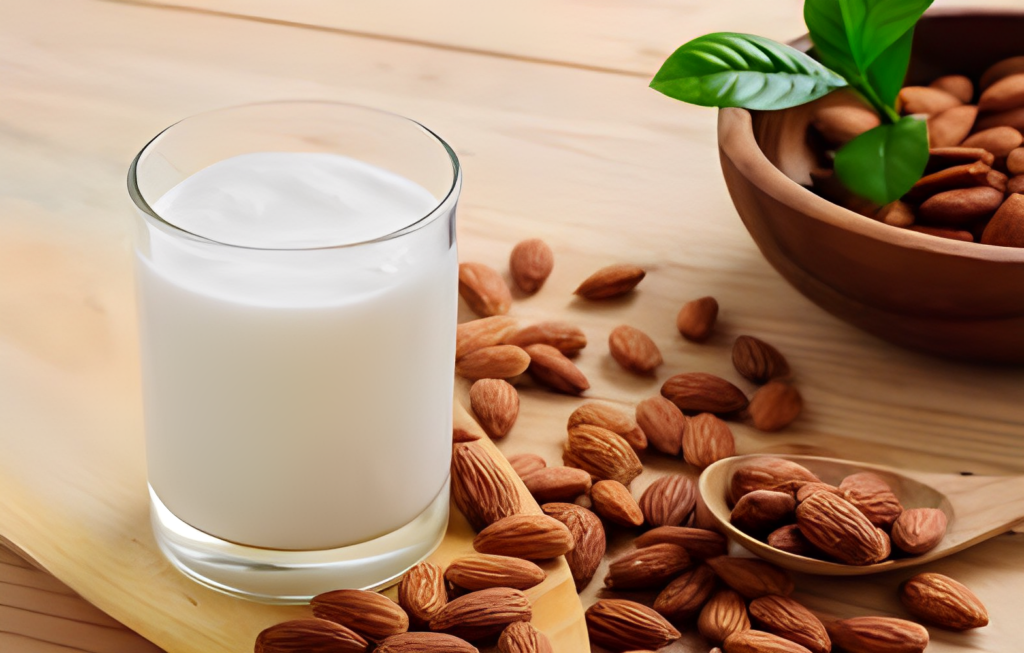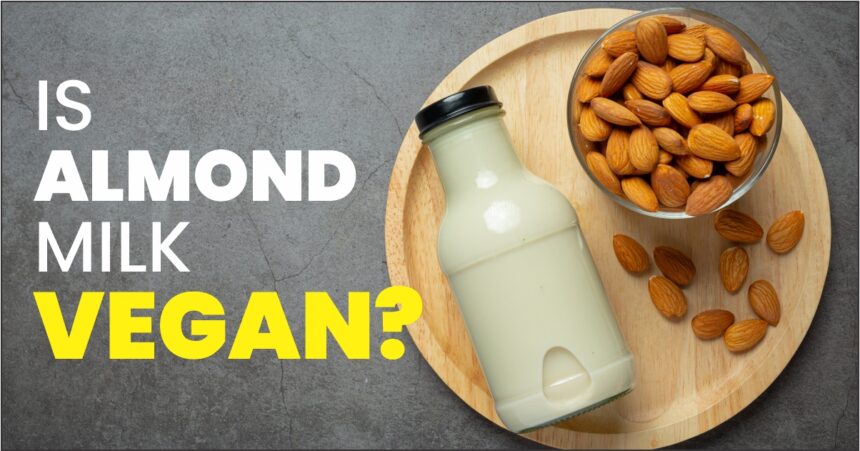Introduction
In recent years, the popularity of almond milk has surged, driven by an increasing number of people adopting plant-based diets. One common question that arises in discussions about almond milk is, “Is almond milk vegan?” In this article, we will explore the intricacies of almond milk and its relationship with veganism.
What is Almond Milk?
Almond milk is a plant-based milk substitute made from almonds. The process involves blending almonds with water and then straining the mixture to create a liquid with a creamy texture. Unlike dairy milk, almond milk is lactose-free and suitable for those with lactose intolerance.
Nutritionally, almond milk is known for being low in calories and a good source of vitamins and minerals. It often comes fortified with additional nutrients like calcium and vitamin D.
Veganism and Almond Milk

Veganism is a lifestyle that seeks to exclude the use of animals for food, clothing, or any other purpose. Almond milk aligns with the principles of veganism as it is entirely plant-based. The absence of animal-derived ingredients makes almond milk a popular choice for those following a vegan diet.
Comparing Almond Milk to Dairy Milk
The environmental impact of food choices has become a significant consideration for consumers. Almond milk, compared to dairy milk, has a lower environmental footprint. The production of almond milk generally requires less water and generates fewer greenhouse gas emissions.
Health considerations also play a role in the choice between almond milk and dairy milk. Almond milk is often chosen for being cholesterol-free and lower in saturated fats, making it a heart-healthy alternative.
Almond Milk in Recipes
The versatility of almond milk extends beyond a dairy milk substitute. It has become a staple ingredient in various recipes, from smoothies and desserts to savory dishes. The mild, nutty flavor of almond milk complements a wide range of culinary creations.
Popular recipes include almond milk-based ice cream, almond milk lattes, and almond milk pancakes. Its ability to enhance both sweet and savory dishes makes almond milk a favorite among home cooks and professional chefs ali
Health Benefits of Almond Milk
Beyond its culinary uses, almond milk offers several health benefits. Rich in vitamin E, an antioxidant that supports skin health, and containing no cholesterol, almond milk can be a nutritious choice. Some studies suggest that almond milk may contribute to better heart health and weight management.
Potential Drawbacks
While almond milk boasts numerous advantages, it’s essential to consider potential drawbacks. Individuals with nut allergies should exercise caution, as almond milk may trigger allergic reactions. Additionally, commercially available almond milk may contain added sugars, affecting its overall nutritional profile.
Sustainability of Almond Milk Production
The environmental impact of almond milk extends beyond its comparative analysis with dairy milk. Almond farming, particularly in regions with water scarcity, has raised concerns about water consumption. Sustainable practices, such as efficient water usage and regenerative farming, aim to mitigate these issues.
Consumer Perspectives
To gain insight into consumer perspectives, surveys and testimonials provide valuable information. Trends in almond milk consumption may vary based on factors like region, age group, and dietary preferences. Understanding these perspectives contributes to a comprehensive view of almond milk’s role in the market.
Also Check:- Disadvantages of non vegetarian food
Almond Milk Brands and Varieties
The market offers a variety of almond milk brands, each with its unique features. Some brands focus on organic or non-GMO ingredients, while others offer flavored options. Understanding the different varieties available allows consumers to make informed choices based on their preferences and values.
Addressing Common Misconceptions
As with any popular food product, almond milk has its share of misconceptions. Common myths related to its production, nutritional content, and environmental impact may circulate. Addressing and dispelling these myths contributes to a more accurate understanding of almond milk.
Almond Milk vs. Other Plant-based Milk Alternatives
The plant-based milk market extends beyond almond milk, with soy, rice, and oat milk being popular alternatives. Factors influencing the choice between these alternatives include taste, nutritional content, and environmental considerations. Understanding the distinctions helps consumers make choices aligned with their preferences and values.
Tips for Choosing and Using Almond Milk
For consumers navigating the grocery aisles, knowing how to choose and use almond milk is crucial. Reading labels for additives, understanding storage requirements, and considering shelf life contribute to a positive consumer experience. These practical tips empower individuals to make the most of their almond milk choices.
Homemade Almond Milk
For those interested in a more hands-on approach, making almond milk at home is a rewarding endeavor. A simple DIY almond milk recipe allows individuals to control ingredients, sweetness levels, and avoid additives. The satisfaction of creating a homemade, preservative-free alternative adds to the appeal of almond milk.
Conclusion
In conclusion, almond milk is a versatile and nutritious option that aligns with vegan principles. Its popularity is not only due to its culinary flexibility but also its potential health benefits and lower environmental impact compared to dairy milk. As consumers navigate the plant-based landscape, understanding the nuances of almond milk contributes to informed and conscious choices.
FAQs
Is almond milk suitable for people with nut allergies?
- Individuals with nut allergies should exercise caution and consult with a healthcare professional before consuming almond milk.
Can almond milk be used as a substitute for dairy milk in cooking and baking?
- Yes, almond milk is a versatile ingredient and can be used as a substitute in various recipes.
Are all almond milk brands vegan-friendly?
- While most almond milk brands are vegan-friendly, it’s advisable to check labels for any non-vegan additives.
What is the environmental impact of almond milk production?
- Almond milk production has a lower environmental impact compared to dairy milk, but concerns about water usage exist.
Can I freeze homemade almond milk?
- Yes, homemade almond milk can be frozen. Ensure proper storage containers and leave room for expansion when freezing.








